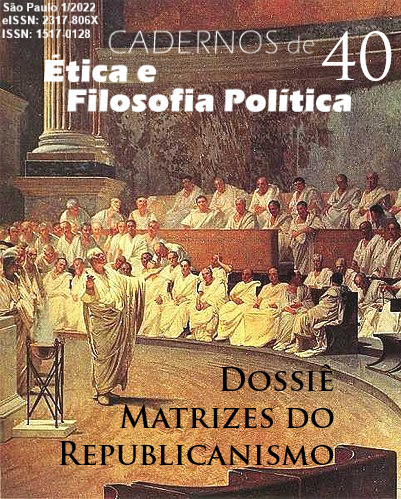Uma defesa do princípio da maioria no contexto dos debates sobre a legitimidade democrática do controle jurisdicional de constitucionalidade das leis
DOI:
https://doi.org/10.11606/issn.1517-0128.v40i1p184-195Palabras clave:
Democracia, Princípio majoritário, Jurisdição constitucionalResumen
O principal objetivo deste artigo é realizar uma crítica ao argumento segundo o qual o princípio majoritário apresenta riscos à democracia, usualmente empregado pelos defensores da legitimidade democrática do controle jurisdicional de constitucionalidade das leis. Em uma sociedade democrática, onde os princípios da liberdade e da igualdade são adotados, o princípio majoritário fornece um critério justo para identificar os pontos de vista que devem prevalecer ao final de processos coletivos de tomada de decisão. As regras da unanimidade e da maioria qualificada são insuficientes para corrigir as alegadas injustiças produzidas pelo princípio da maioria, em virtude das dificuldades de efetivação que possuem, da ausência de real proteção às minorias e das contradições internas que apresentam. Embora seja possível imaginar um sistema jurídico no qual o princípio majoritário viabilize a existência de uma tirania ou ditadura da maioria, presumir que, nesse contexto, os juízes necessariamente formarão o grupo de defensores dos direitos das minorias é realizar uma aplicação seletiva do princípio da igualdade.
Descargas
Referencias
ARISTÓTELES. A Política. 2. ed. Bauru: Edipro, 2009.
BARROSO, Luís Roberto. O controle de constitucionalidade no direito brasileiro. 4. ed. São Paulo: Saraiva, 2009.
BERCOVICI, Gilberto. Soberania e constituição: para uma crítica do constitucionalismo. 2. ed. São Paulo: Quartier Latin, 2013.
CHURCHLAND, Patricia. Braintrust: What Neuroscience Tells Us about Morality. New Jersey: Princeton University Press, 2011.
DAHL, Robert. Democracy and its Critics. New Haven: Yale University Press, 1989.
DUNBAR, Robin. Human Evolution: Our Brains and Behavior. Oxford University Press, 2016.
DWORKIN, Ronald. Justice for Hedgehogs. Cambridge: Harvard University Press, 2011.
FLANAGAN, Owen. The Geography of Morals: Varieties of Moral Possibility. Oxford: Oxford University Press, 2017.
GAZZANIGA, Michael S. Who’s in Charge? Free Will and the Science of the Brain. New York: HarperCollins Publishers, 2011.
GOYARD-FABRE, Simone. O que é democracia? São Paulo: Martins Fontes, 2003.
HAIDT, Jonathan. The Righteous Mind: Why Good People Are Divided by Politics and Religions. New York: Vintage Books, 2013.
HAMILTON, Alexander; JAY, John; MADISON, James. The Federalist Papers: An Electronic Classic Series Publication. Disponível em: <http://www2.hn.psu.edu >. Acesso em 30 nov. 2014.
KELSEN, Hans. A democracia. São Paulo: Martins Fontes, 2000.
KELSEN, Hans. Jurisdição constitucional. São Paulo: Martins Fontes, 2007.
LOCKE, John. Two Treatises of Government and A Letter Concerning Toleration. New Heaven: Yale University Press, 2003.
MAUS, Ingeborg. “O judiciário como superego da sociedade”. Disponível em: <http://www.direitocontemporaneo.com>. Acesso em: 28 jul. 2016.
MONTESQUIEU. O espírito das leis. 3 ed. São Paulo: Martin Fontes, 2005.
MOUFFE, Chantal. On the Political. London: Routledge, 2005.
ORWELL, George. Animal Farm. New York: Houghton Mifflin Harcourt, 2003.
RAWLS, John. Justice as Fairness: A Restatement. Cambridge (MA): Harvard University Press, 2001.
ROUSSEAU, Jean Jacques. O contrato social: princípios do direito político. Bauru: Edipro, 2013.
SEARLE, John R. Making the Social World: The Structure of Human Civilization. Oxford: Oxford University Press, 2010.
SOUZA, Jessé. A tolice da inteligência brasileira: ou como o país se deixa manipular pela elite. São Paulo: LeYa, 2015.
STRECK, Lênio Luiz. Verdade e consenso: constituição, hermenêutica e teorias discursivas. 4. ed. São Paulo: Saraiva, 2012.
TOMASELLO, Michael. A Natural History of Human Morality. London: Harvard University Press, 2016.
WALDRON, Jeremy. The Dignity of Legislation. Cambridge: Cambridge University Press, 1999.
WALDRON, Jeremy. “The Core of the Case Against Judicial Review”. The Yale Law Journal. Disponível em: <http://philosophyfaculty.ucsd.edu/FACULTY/RARNESON/Courses/Waldroncore.pdf>. Acesso em: 28 mar. 2017.
Descargas
Publicado
Número
Sección
Licencia
Derechos de autor 2022 Paulo de Tarso Fernandes Souza, Martônio Mont'Alverne Barreto Lima

Esta obra está bajo una licencia internacional Creative Commons Atribución-CompartirIgual 4.0.


